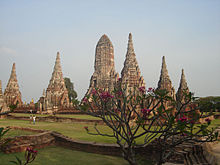Thammathibet
Chaofa Thammathibet ( Thai เจ้าฟ้า ธรรม ธิ เบ ศร , also Chaofa Kung Rattanakawi or Goong; * in the 18th century; † 1756 in Ayutthaya ) was Maha Uparat (“Viceroy”) of the Kingdom of Ayutthaya since 1732/33 , but he is much more known as one of Thailand's most important poets. He also created the music for the royal barque procession .
Life
Prince Thammathibet was the eldest son of King Borommakot (ruled 1733 to 1758) and Queen Phra Phan.
In his poetic works, which are praised for their lyrical language, Thammathibet describes the beauty of the royal barque procession , illustrating the work of the rowers, the individual boats and the sight of the entire processional fleet. Nature, flora and fauna, are also subjects of his poetry. Often he deals with the beauty of women. This last subject eventually becomes his undoing in real life.
Thammathibet and his half-brother Chao Sakaeo (Prince Sunthon Thep) had a dispute over an elephant that had made it overly pompous. In April 1756, it is reported, he besieged the palace of his half-brother and forbade any entry or exit. However, Chao Sakaeo and his sons were able to get to the king's palace and bring his complaints there. The king was completely surprised by these arguments. In addition, Thammathibet hurried to the royal palace to face his opponents. But he was not allowed in, and so he returned to his own palace.
He was later quoted before his father, who asked him why he was cocky and why he assumed such authority. Thammathibet remained silent, which only angered the king even more. He had his son put in jail. Thammathibet was chained in a solitary cell and no one was allowed to see him. In the meantime, the allegations against him increased. King Borommakot commissioned Chao Sakaeo and Chao Krommun Poon, along with Okya Chakri and the Phraklang, to question the prisoner, a choice that did not bode well. Thammathibet did not testify and was punished twice with twenty lashes, after which the soles of his feet were burned.
His most important advisors were also arrested and "questioned". They confessed to many things: Thammathibet had copies made of the keys to the chambers of the king, queen, and royal concubines. In this way he was able to gain access to the rooms at night. In addition, his followers had bought and hidden weapons that should be used at the right moment. Finally, they confessed that Thammathibet was responsible for the deaths of several monks and the maiming of some of his subordinates. The king then ordered fifty more blows.
During further interrogations, Thammathibet confessed that he had visited four of the numerous royal concubines and planned to assassinate the king (his father) and his family and to usurp power in Ayutthaya. Angry, the king gave orders that Thammathibet should be dealt fifty more blows and that his forehead, arms and legs were burned. In the course of this torture, Thammathibet, the four concubines and some of the prince's senior advisers died.
Prince Thammathibet was cremated at Wat Chai Watthanaram in Ayutthaya together with Chao Fa Nim, his father's first concubine, and Chao Sangwan according to the Buddhist rite.
Works
The rowing songs ( Kap He Ruea , กาพย์ เห่เรือ ) and the Nirat poems are still read in Thai schools today.
- He Kaki ( บท เห่ เรื่อง กากี 3 ตอน )
- He Sangwat ( บท เห่ สังวาส )
- He Kruan Labot ( เห่ ครวญ อย่าง ละ บท )
- Cape Ho Khlong ( กาพย์ ห่อ โคลง )
- Nirat Thansok ( นิราศ ธาร โศก )
- Nirat Than Thongdaeng ( นิราศ ธาร ทองแดง )
- Lilit Nanthopananthasutra Kham Luang ( นั น โท ป นันท สูตร คำ หลวง )
- Lilit Phra Malai Kham Luang ( พระ มาลัย คำ หลวง )
literature
- Bhawan Ruangslip: Dutch East India Company Merchants at the Court of Ayutthaya: Dutch Perception of the Thai Kingdom, c. 1604-1765 . Brill, Leiden 2007, ISBN 978-90-04-15600-5 .
Web links
- Brief description of the life of Prince Thammathibet (PDF; 2.0 MB) accessed on May 7, 2012
Individual evidence
- ↑ Bhawan Ruangslip: Dutch East India Company Merchants at the Court of Ayutthaya: Dutch Perception of the Thai Kingdom, c. 1604-1765 . Brill, Leiden 2007, ISBN 978-90-04-15600-5 , pp. 201 f.
| personal data | |
|---|---|
| SURNAME | Thammathibet |
| ALTERNATIVE NAMES | Chaofa Thammathibet; เจา ฟา ธรรม ธิ เบ ศร (Thai); Chaofa Kung Rattanakawi; Chaofa Goong Rattanakawi |
| BRIEF DESCRIPTION | Thai poet and viceroy of the Kingdom of Ayutthaya |
| DATE OF BIRTH | 18th century |
| DATE OF DEATH | 1756 |
| Place of death | Ayutthaya |
